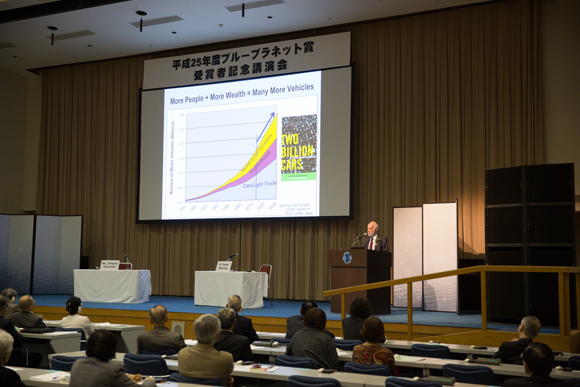Daniel Sperling wears two different, difficult but very important hats — an academic and a regulator.
 Daniel Sperling
Daniel SperlingSperling, director of the Institute of Transportation Studies, and a professor of civil engineering and environmental science and policy at the University of California, Davis, is also an environmental policy adviser for the state of California, having been appointed by Gov. Arnold Schwarzenegger to the "automotive engineering" seat on the California Air Resources Board.
Sperling was awarded the Blue Planet Prize, a prize given for great contributions to global environmental issues by The Asahi Glass Foundation, this year for his achievement of having his transportation system study implemented as California state policy, which was copied by other U.S. states and countries worldwide.
"The reason I think I got the prize is that I brought research and science to the design of public policy on transportation systems and vehicles," Sperling said in a recent interview in Tokyo.
His chief responsibilities in the California Air Resources Board are oversight and design of the state's climate change policy, alternative fuels, vehicle travel and land use, and zero-emission vehicle programs.
One of his greatest achievements is to establish the Low Carbon Fuel Standard, which was enforced in California in 2011. The standard requires oil companies to cut the concentration of carbon in oil by 10 percent by 2020. The standard was also adopted in countries in Europe and other regions.
The standard also allows oil companies that do not want to cut carbon to buy credits from oil companies that can. Such a system will stimulate the economy in many ways, including oil companies bringing oil refining and production to the U.S. to increase domestic employment.
He also helped California to set rules and standards on greenhouse gas emissions from automobiles and other infrastructure, calling for automakers to enhance technology and consumers to raise awareness.
Wearing two hats
When he obtained the governmental position in 2007, the change from being only an academic to being that and a regulator was "very difficult," he said.
 Two hats: Daniel Sperling makes a speech during the 2013 Blue Planet Prize Commemorative Lectures in Tokyo on Oct. 31. THE ASAHI GLASS FOUNDATION
Two hats: Daniel Sperling makes a speech during the 2013 Blue Planet Prize Commemorative Lectures in Tokyo on Oct. 31. THE ASAHI GLASS FOUNDATION"The thought process is very different. Academia thinks of theory, always questions and embraces uncertainty. Regulators don't like uncertainty and take specific actions," he said.
"Before I designed the Low Carbon Fuel Standard, I thought I knew about 90 percent of what I needed to know. But in working on a governmental policy, I felt like I knew only 20 percent of what I needed to know," Sperling said.
Things he did not know include trading rules, such as the World Trade Organization's rules, and the fact that policymakers must take into consideration the business impact of policies on each company, he said.
"After all, I need to know which policy is enforceable because the goal is to enforce policies. I must also use easily accessible data (to explain the validity of policies) and learned everything must be transparent," he said.
Blue Planet Prize
http://www.af-info.or.jp/blog/b-info_en/
The Asahi Glass Foundation
http://www.af-info.or.jp/en/

The Blue Planet Prize was founded by The Asahi Glass Foundation in 1992 to honor people or groups in science and technology who make great contributions to solving environmental issues.

Taroh Matsuno is a modest man who wants to give credit to young scientists for various achievements in his research field — climate study. "I shouldn't be a main character. The main characters are young researchers who actually do a ...